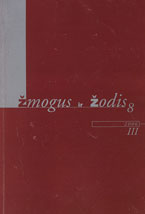Lietuvių kalba, gimtoji ir valstybinė, vidurinėje mokykloje: situacijos analizė
Lithuanian Language as a Mother Tongue and a State Language in Secondary Schools: Situation Analysis
Author(s): Vilija Salienė, Loreta VilkienėSubject(s): Language and Literature Studies
Published by: Vytauto Didžiojo Universitetas
Keywords: Lithuanian as a mother tongue; Lithuanian as a state language; native speaker; non-native user of Lithuanian; competent language user; curriculum; educational standards.
Summary/Abstract: The current plan is to introduce uniform content of examinations of the Lithuanian language as a mother tongue and of the Lithuanian language as a non-native language. The question is whether it is possible, i.e. whether the same measurements can apply to both native speakers of Lithuanian (hereinafter referred to as Ll) and non-native users of Lithuanian (hereinafter referred to as L2). Moreover, there are doubts as to whether it is possible to prepare school students following different curricula and aiming for different educational standards for the same examination. The authors of the article raise the hypothesis that the current situation with the Lithuanian language education (as a mother tongue and as a statė language) does not provide favourable conditions for the introduction of uniform content of examinations and uniform requirements. The purpose of the article is to provide an overview of the characteristics of Ll and L2 users, to compare them in search for a theoretical answer to the question if, in principle, it is possible to have the same content of the examination, as well as to analyse the current situation with the Lithuanian language education (as a mother tongue and as a state language) in secondary schools, i.e. to assess the existing differences in the current curricula of general education and the applicable educational standards, and to establish whether these differences are significant in the process of forming language competence, based on the work of foreign scientists researching native and non-native language issues. The object of the work encompasses programme documents on; education in Lithuania, subject-related and mcthodological literature, as well as works of foreign scientists. The following work methods were applied: ahalytical descriptive, comparative and contrastive, summarising. The following conclusions have been drawn in the article: 1) theoretically Ll and L2 users can acquire very simifar language competence (L2 users can have a language competence resembling that of native speakers), however the quality of their native and non-native language knowledge cannot become uniform and thus cannot be measured against the same criteria, which means that there are no theoretical assumptions for the introduction of uniform content examinations; 2) the hypothesis that the current situation with the Lithuanian language education (as a mother tongue and a statė language) does not provide favourable conditions for the introduction of uniform content examinations and uniform requirements has proved to be correct, because applicable curricula, educational standards and time allocated for covering the content of education differ; therefore, the authors of the article would think that the currently applicable regulative documents on education do not allow for automatic unification of the content of Matura examinations of the Lithuanian language as a mother tongue and as a state language.
Journal: Žmogus ir žodis
- Issue Year: 08/2006
- Issue No: 3
- Page Range: 74-80
- Page Count: 7
- Language: Lithuanian

